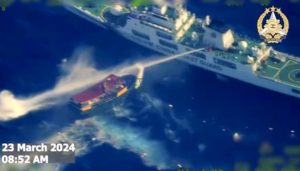Chinese vessels have again blocked and fired water cannons at a Philippine supply ship close to a disputed shoal in the South China Sea, causing “heavy damage” to the wooden vessel and injuries to several of its crew, according to the Philippine government.
In a series of social media posts on Saturday, the Armed Forces of the Philippines (AFP) reported that Unaizah May 4 supply boat was en route to Second Thomas Shoal with two Philippine Coast Guard (PCG) escorts when all were blocked and surrounded by China Coast Guard (CCG) ships.
According to the AFP, at just after 6 a.m. a CCG vessel performed a “dangerous maneuver of crossing the bow” of the supply boat. About an hour later, the AFP said, the CCG then conducted a “reverse blocking maneuver” against the Unaizah May 4, causing a “near collision,” before two CCG vessels directed their high-pressure water cannons at the boat. The supply boat “sustained heavy damage at around 08:52 due to the continued blasting of water cannons” the AFP said, rendering it immobile. It also released videos showing the bow-cutting and water cannon incidents.
The Unaizah May 4 was attempting to deliver supplies and a fresh contingent of Philippine personnel to the BRP Sierra Madre, a warship that the Philippines grounded at Second Thomas Shoal in 1999. The shoal has been the scene of repeated confrontations between Chinese and Philippine vessels over the past year, as Beijing has repeatedly attempted to prevent the resupply of the isolated outpost. This has involved collisions and damage to a number of Philippine supply boats.
Given the decrepit condition of the BRP Sierra Madre, which some observers believe could soon disintegrate, it appears that Beijing views the shoal as the most weakly-held of the nine Philippine-occupied features in the South China Sea.
In a later statement, the National Task Force for the West Philippine Sea condemned the Chinese actions as “acts of unprovoked aggression, coercion, and dangerous maneuvers.” It added, “the systematic and consistent way in which [China] continues to carry out these illegal and irresponsible actions belies its hollow claims to peace, dialogue, and adherence to international law.”
The United States and Japan immediately expressed their support to the Philippines and condemned the Chinese action, as they have done after most of the recent incidents around Second Thomas Shoal.
U.S. State Department spokesperson Matthew Miller said in a statement that Washington “stands with its ally the Philippines and condemns the dangerous actions by the People’s Republic of China (PRC) against lawful Philippine maritime operations in the South China Sea on March 23.” He said that the Chinese actions were “destabilizing to the region and show clear disregard for international law.”
Despite the obstructive Chinese actions, the Philippine vessels were ultimately able to complete their resupply mission. The two PCG patrol ships maneuvered through the Chinese blockade and towed the disabled Unaizah May 4 to safety. Another motorboat then managed to transport the Filipino sailors and supplies to BRP Sierra Madre, despite the CCG’s attempt to block them by placing a floating barrier in the waters.
But the Chinese goal is seemingly to make each resupply mission a test of Philippine resources and resolve, in the hope – or perhaps the expectation – that the eventual disintegration of the Philippine warship will allow Beijing to assume control of the shoal.
China’s Defense Ministry yesterday accused the Philippines of seeking to convert its grounded warship into “a permanent facility” and said that China would not “sit idly by” and let this happen.
“We are warning the Philippines to stop making any remarks that may lead to the intensification of conflicts and escalate the situation, and stop all infringements and provocations,” Defense Ministry spokesperson Wu Qian said in a statement. “If the Philippines repeatedly challenges China’s bottom line, China will continue to take resolute and decisive measures to firmly safeguard its territorial sovereignty and maritime rights and interests.”

































